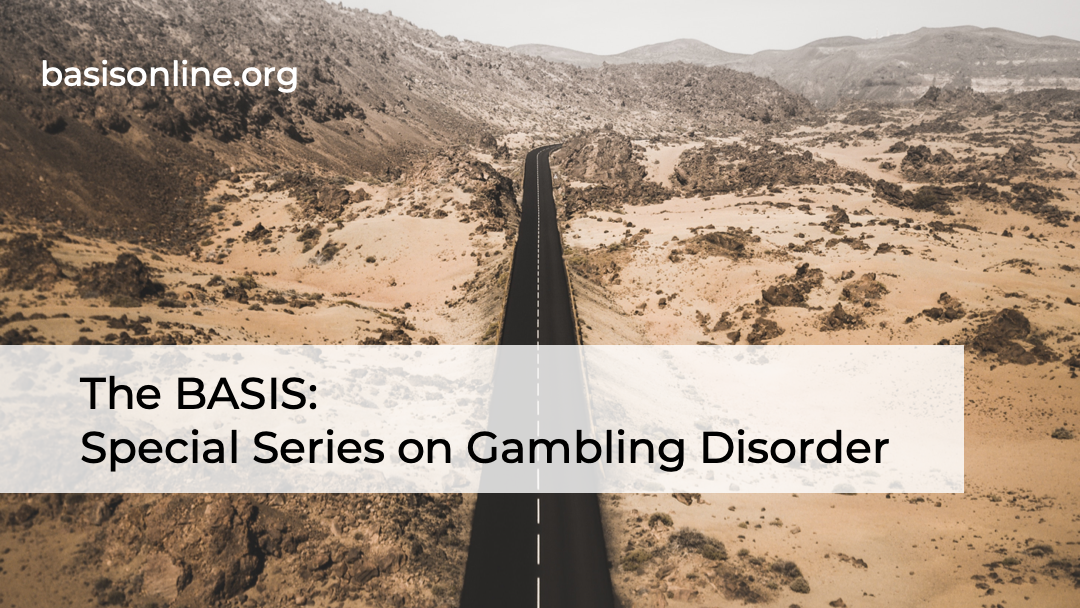 Here at The BASIS, we have a tradition of dedicating every March to the topic of Gambling Disorder. Our focus coincides with Problem Gambling Awareness Month, an initiative of the National Council on Problem Gambling designed to raise awareness of prevention, treatment, and recovery services.
Here at The BASIS, we have a tradition of dedicating every March to the topic of Gambling Disorder. Our focus coincides with Problem Gambling Awareness Month, an initiative of the National Council on Problem Gambling designed to raise awareness of prevention, treatment, and recovery services.
First, Dr. Debi LaPlante of the Division on Addiction will preview this year’s Gambling Disorder Screening Day, a grassroots initiative to promote screening and early detection among people who might be at-risk for gambling-related problems. Since we launched this initiative six years ago, healthcare providers across the United States and beyond have begun screening their clients for gambling-related problems. Screening Day is on Tuesday, March 12th, and providers who are interested in screening their clients can find a free toolkit with all necessary information here.
All through the month, we will review recently published scientific articles related to Gambling Disorder. The DRAM will review a study of commercials for online sports betting and how alcohol consumption is depicted in these ads. ASHES will explore whether people who are dependent on tobacco can achieve gambling abstinence at the same rate as those who do not use tobacco. STASH will review a study of gambling-related problems and stimulant use among adolescents. Finally, The WAGER will describe a study of gambling problems among poker players and how those problems change over time. Together, these science reviews illustrate the diversity and quality of current research on Gambling Disorder.
 Nothing illustrates the experience of Gambling Disorder better than the personal stories of those affected by it. During the second week of this Special Series, we will present an op-ed written by the daughter of a man who struggled with gambling-related problems. Hers is a story of loss but also of recovery and reconciliation.
Nothing illustrates the experience of Gambling Disorder better than the personal stories of those affected by it. During the second week of this Special Series, we will present an op-ed written by the daughter of a man who struggled with gambling-related problems. Hers is a story of loss but also of recovery and reconciliation.
We hope you will enjoy and learn from this Special Series.
For more information:
Do you think you or someone you know has a gambling problem? For gambling screens and self-help tools, visit The BASIS Addiction Resources page. The confidential 24-hour National Helpline is available at 1-800-522-4700 (call or text).
— Heather Gray, Ph.D.
Dr. Heather M. Gray is Associate Director of Academic Affairs at the Division on Addiction at Cambridge Health Alliance.
What do you think? Please use the comment link below to provide feedback on this article.





Cheryl Thurman March 2, 2019
I have questions.Can a person with gambling disorder gamble “a little”. That is, consider it success if they buy just one scratcher ticket? And should the spouse stop gambling also if their significant other has gambling disorder?
Howard Shaffer March 4, 2019
Thanks for your interest in The BASIS. Your question is very complicated because important issues are implicit within the question. First, you are assuming that “gambling disorder” is a permanent problem. There is evidence that some people recover from gambling disorder. This is most often obtained when the individual stops gambling and remains abstinent. However, in every area of addiction, there are people who can “chip” at their addiction; that is, there are people who can gamble “a little” and not relapse. Nevertheless, the evidence is consistent that this path to recovery is difficult and filled with potential obstacles. Despite my willingness to talk about “chipping” and consider a variety of using patterns to recovery among treatment seekers, very, very few have been successful “chippers.”
I have seen loved ones drink or gamble in the presence of someone who is working to avoid such behavior and move toward recovery. Though unintended, this often leads to relapse. Though few people recover in the midst of others who are gambling, it is possible. So, I am mentioning it. Perhaps most importantly, we need to ask why is this question being asked? What is the spouse’s objective here? Is abstinence, control or active gambling the goal? What makes gambling so important?
-Howard Shaffer, PhD, CAS